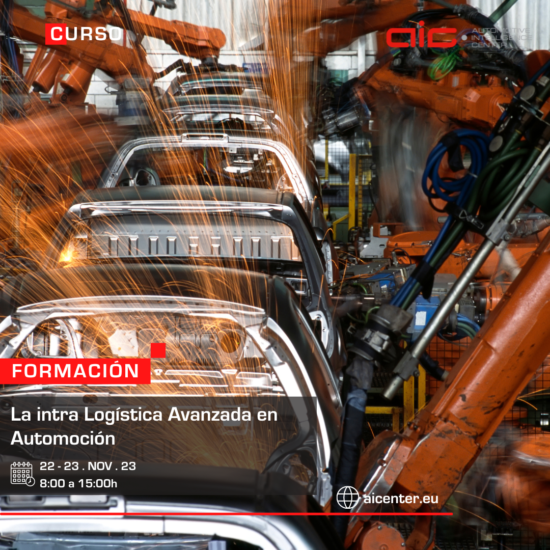
Course taught by our partner AIC-Automotive Intelligence Center
The reality of the internal logistics world as we know it in the automotive industry is facing major evolutions to transform today’s factory into an autonomous, agile and flexible environment with lean inventories. This concept is the result of the integration of automatization, technologies, management systems and people, with the aim of anticipating and executing movements along the value chain with the greatest precision and speed while generating the lowest possible cost. Having an effective and efficient intra-logistics system that makes a difference for the sector requires an in-depth knowledge of the opportunities that technologies, digital tools and people can offer. This training action brings knowledge to the logistics function about the challenges and scenarios that arise to optimize its current performance as well as to facilitate the deployment of the future concept.
DATE, TIME and PLACE:
November 22 and 23, from 8:00 to 15:00.
At the AIC Academy (Amorebieta-Etxano).
LENGTH: 14 hours
ADDRESSED TO:
Managers and technicians mainly related to the areas of Logistics, Engineering, Production, digital transformation, industry 4.0 and operations.
OBJECTIVES:
Attendees will be able to identify the main actions to go through in their companies to cause a qualitative leap in the management of their internal logistics, covering their strategy, organization, operational processes, physical plane (automation/technologies) and logical plane (digitalization/information flow); deploying conventional as well as advanced actions related to industry 4.0.
TABLE OF CONTENTS:
Autonomous, agile and flexible logistics as a challenge.
Traditional internal logistics
- Balancing the trinomial: Service – Productivity – Inventories.
- Efficiency:
- Supply chain management and service level.
- Warehouse design: Storage and picking system
- Stock sizing
- Point-of-use procurement and means of transport.
- Effectiveness:
- Synchronized and optimized processes
- Integrated partners
- Sustainability and progress, deviation management and improvement of standards.
- Targeted information and agile decision making
- Analysis methods and tools
- Action management
- Practice: maturity level assessment
- Advanced internal logistics
- Flexible automation
- New model of internal integration between logistics and production 3.
- Optimized transport routes
- Logistics resources as part of the production flow
- Health of the key logistics resources to guarantee the cadence of production.
- New relationship model between suppliers, customers and plant from start to finish in the overall flow:
- Real-time visibility of customer needs, as well as location and status of shipments.
- End-to-end traceability
- Redefinition of internal roles and functions
- Augmented personas with agile and complete information at the point of use.
- Anticipation of the appearance of problems in logistical resources, deviations in the reception of material and new needs.
- Technologies applied

